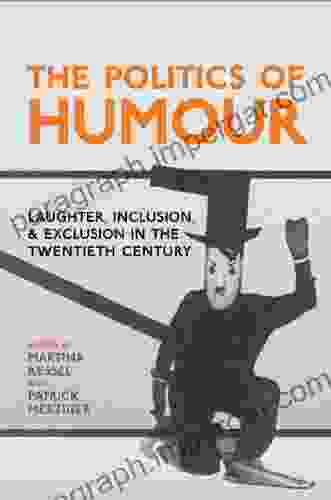Laughter, Inclusion, and Exclusion in the Twentieth Century: German and European Perspectives

5 out of 5
| Language | : | English |
| File size | : | 1843 KB |
| Text-to-Speech | : | Enabled |
| Enhanced typesetting | : | Enabled |
| Word Wise | : | Enabled |
| Screen Reader | : | Supported |
| Print length | : | 232 pages |
Laughter is a complex and multifaceted phenomenon that can have both positive and negative effects on social relationships. In the twentieth century, laughter was used as a tool for social control, exclusion, and resistance in both Germany and Europe. This article explores the complex interplay between laughter, inclusion, and exclusion in the twentieth century German and European context.
Laughter as a Tool for Social Control
In the early twentieth century, laughter was often used as a tool for social control. This was especially true in Germany, where the government used laughter to ridicule and humiliate its political opponents. For example, in 1933, the Nazis produced a propaganda film called The Triumph of the Will that featured footage of Hitler and his followers laughing at and mocking their opponents. This film was used to create a sense of unity among the German people and to demonize their enemies.
Laughter was also used as a tool for social control in other European countries. For example, in the Soviet Union, laughter was used to ridicule and humiliate those who were considered to be enemies of the state. This was especially true during the Stalinist era, when laughter was used to create a climate of fear and paranoia.
Laughter as a Tool for Exclusion
Laughter can also be used as a tool for exclusion. This is because laughter can create a sense of belonging among those who share the same sense of humor. However, it can also create a sense of exclusion among those who do not share the same sense of humor. This can be especially harmful to those who are already marginalized or excluded.
For example, in the United States, black people have often been the target of racist jokes. These jokes can be very hurtful and can make black people feel excluded and unwelcome. Similarly, in Europe, Jews have often been the target of anti-Semitic jokes. These jokes can be very hurtful and can make Jews feel excluded and unwelcome.
Laughter as a Tool for Resistance
Laughter can also be used as a tool for resistance. This is because laughter can be a way to challenge authority and to express dissent. For example, during the Nazi era in Germany, many people used laughter to resist the Nazi regime. They would tell jokes about Hitler and the Nazis, and they would laugh at the Nazis' propaganda films. This laughter was a way to show that they did not support the Nazi regime and that they were not afraid of them.
Laughter has also been used as a tool for resistance in other European countries. For example, in the Soviet Union, many people used laughter to resist the Stalinist regime. They would tell jokes about Stalin and the Communist Party, and they would laugh at the regime's propaganda. This laughter was a way to show that they did not support the regime and that they were not afraid of it.
Laughter is a complex and multifaceted phenomenon that can have both positive and negative effects on social relationships. In the twentieth century, laughter was used as a tool for social control, exclusion, and resistance in both Germany and Europe. This article has explored the complex interplay between laughter, inclusion, and exclusion in the twentieth century German and European context.
Laughter can be a powerful force for good, but it can also be a powerful force for evil. It is important to be aware of the different ways in which laughter can be used, and to use it wisely.
References
- Berenbaum, Michael. The World Must Know: The History of the Holocaust as Told in the United States Holocaust Memorial Museum. Little, Brown and Company, 1993.
- Dawidowicz, Lucy S. The War Against the Jews, 1933-1945. Holocaust Library, 1986.
- Fest, Joachim C. Hitler: A Biography. Harcourt Brace Jovanovich, 1974.
- Kershaw, Ian. Hitler: 1889-1936: Hubris. Penguin Books, 1998.
- Kershaw, Ian. Hitler: 1936-1945: Nemesis. Penguin Books, 2000.
- Longerich, Peter. Hitler: A Biography. Oxford University Press, 2019.
- Rees, Laurence. The Holocaust: A History. Penguin Books, 1997.
- Rosenbaum, Ron. Explaining Hitler: The Search for the Origins of His Evil. Random House, 1998.
- Shirer, William L. The Rise and Fall of the Third Reich: A History of Nazi Germany. Simon & Schuster, 1960.
- Snyder, Timothy. Bloodlands: Europe Between Hitler and Stalin. Basic Books, 2010.
- Wied
5 out of 5
| Language | : | English |
| File size | : | 1843 KB |
| Text-to-Speech | : | Enabled |
| Enhanced typesetting | : | Enabled |
| Word Wise | : | Enabled |
| Screen Reader | : | Supported |
| Print length | : | 232 pages |
Do you want to contribute by writing guest posts on this blog?
Please contact us and send us a resume of previous articles that you have written.
 Book
Book Novel
Novel Page
Page Chapter
Chapter Text
Text Story
Story Genre
Genre Reader
Reader Library
Library Paperback
Paperback E-book
E-book Magazine
Magazine Newspaper
Newspaper Paragraph
Paragraph Sentence
Sentence Bookmark
Bookmark Shelf
Shelf Glossary
Glossary Bibliography
Bibliography Foreword
Foreword Preface
Preface Synopsis
Synopsis Annotation
Annotation Footnote
Footnote Manuscript
Manuscript Scroll
Scroll Codex
Codex Tome
Tome Bestseller
Bestseller Classics
Classics Library card
Library card Narrative
Narrative Biography
Biography Autobiography
Autobiography Memoir
Memoir Reference
Reference Encyclopedia
Encyclopedia Jim Bernhard
Jim Bernhard Joan Dayan
Joan Dayan Jennifer Chicoine
Jennifer Chicoine Jennifer Wilcox
Jennifer Wilcox Jeffery A Hogge
Jeffery A Hogge Johanna Rothman
Johanna Rothman Jennifer Louissa
Jennifer Louissa Jeffery D Nokes
Jeffery D Nokes Jeffrey Crelinsten
Jeffrey Crelinsten Johann Korkisch
Johann Korkisch Joe Pettitt
Joe Pettitt Jephtha Oketch Malelah
Jephtha Oketch Malelah Jena Pincott
Jena Pincott Jefferson Bryant
Jefferson Bryant Jerret Gardner
Jerret Gardner Jessica Whyte
Jessica Whyte Jim Dekorne
Jim Dekorne Jim Gottstein
Jim Gottstein Jerome E Groopman
Jerome E Groopman Joel J Orosz
Joel J Orosz
Light bulbAdvertise smarter! Our strategic ad space ensures maximum exposure. Reserve your spot today!

 William FaulknerThe British 62nd And Canadian 4th Divisions In Battle: Studies In Canadian...
William FaulknerThe British 62nd And Canadian 4th Divisions In Battle: Studies In Canadian... Jeff FosterFollow ·18.4k
Jeff FosterFollow ·18.4k Tim ReedFollow ·5.7k
Tim ReedFollow ·5.7k Herman MitchellFollow ·7.6k
Herman MitchellFollow ·7.6k Levi PowellFollow ·11.8k
Levi PowellFollow ·11.8k Ethan GrayFollow ·19.2k
Ethan GrayFollow ·19.2k Doug PriceFollow ·9.5k
Doug PriceFollow ·9.5k Jan MitchellFollow ·10.1k
Jan MitchellFollow ·10.1k Foster HayesFollow ·17.6k
Foster HayesFollow ·17.6k

 Christian Barnes
Christian BarnesUnleash Your Creativity: Build Interlocking 3D Animal and...
Discover the Art of Paper...

 Terry Bell
Terry BellUnveiling the Secrets of Winning: A Comprehensive Guide...
In the realm of chance and fortune, the...

 Albert Camus
Albert Camus101 Things That You Should Do Before Leaving The House In...
Starting your day right is...

 Anthony Burgess
Anthony BurgessForcing Move 2024 Volume: Unleash Your Inner Grandmaster
Embark on an extraordinary chess...
5 out of 5
| Language | : | English |
| File size | : | 1843 KB |
| Text-to-Speech | : | Enabled |
| Enhanced typesetting | : | Enabled |
| Word Wise | : | Enabled |
| Screen Reader | : | Supported |
| Print length | : | 232 pages |














